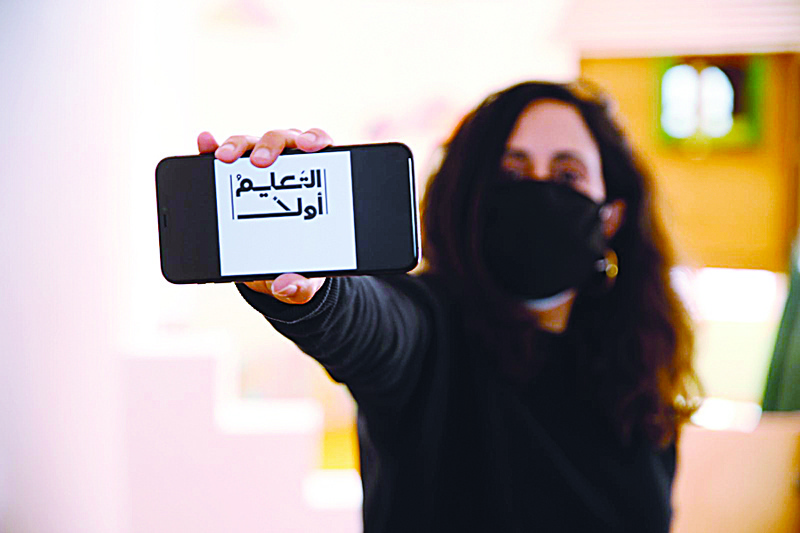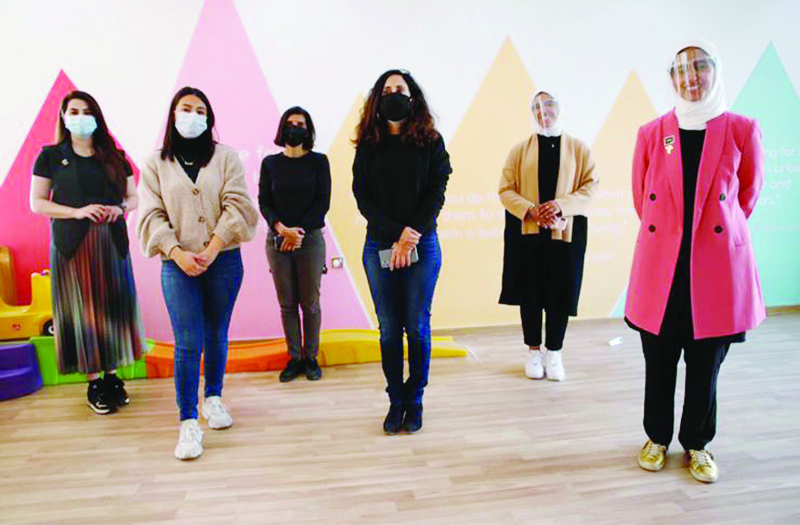By Ben Garcia
KUWAIT: A year after in-person classes were halted, a group called 'Education First Kuwait' has demanded the education ministry must lay down a clear roadmap for face-to-face classes to resume as soon as possible. Dr Duna Al-Mashaan, education consultant and one of the group's advocates, spoke to Kuwait Times on the one-year anniversary of school closures in Kuwait at Bcurious Preschool in Shuhada.
"One year is very long. Countries around us in the Middle East and even other countries in the West are back to traditional classes, of course with strict implementation of health protocols. If they can, why can't we," she asked. Mashaan said until now there has been no clear plan or path for action to go back to traditional face-to-face classes, adding "365 days without traditional classes affects the learning abilities of our students and can affect our children's academic and mental abilities too."
 Dr Duna Al-Mashaan
Dr Duna Al-Mashaan"We must do something about this. We call upon the government to set a clear roadmap for schools on where to go and the fastest way to return to the traditional school setting. September is coming, the next school year is coming, but there is no clear plan yet. They only talk about bringing back traditional classes, but any plan has to be rolling by now because other countries around us in the Middle East are back to traditional schooling," Mashaan said.
'Live with COVID'
"We have to learn to live life with COVID - this COVID will stay till kingdom come! We need a plan; we need radical actions in the sector of education because we are already left behind. It is affecting our children, so we want to see a plan. When will be the start of face-to-face classes - we need to know by now," she demanded.
According to Mashaan, the government must understand that based on studies, face-to-face classes are not likely to be main COVID superspreader events. "Based on previous studies, face-to-face classes are not spreaders of the disease, but restaurants and gatherings at diwaniyas and weddings are. New York schools are at 0.5 percent infection rates only compared to the community spread of over 3 percent. In Qatar, there is only a 0.7 percent infection rate, while the community spread is much higher at 12-13 percent," she said.
Education First Kuwait is advocating for a hybrid form of face-to-face classes. "If there are 20 students in one classroom, 10 must come to school and the other 10 must attend online classes at home and vice-versa - alternate students who attended classes at school today and the next day," Mashaan said. "We need to be creative; we need to ask our government to allow traditional classes as soon as possible. If they plan to do this in September, by now we should be ready with a clear path forward."
Children 'unhappy'
Based on studies, according to Mashaan, the closure of schools only brought children unhappiness, uneasiness, lack of motivation and loss of social skills. Because of non-traditional schooling, children are beginning to engage in dangerous activities such as unsupervised Internet browsing, bullying of siblings and withdrawal, she added.
"Children need to socialize to develop their sense of self. They can see themselves through their peers. They are missing this part of growing up and we need to be reminded that we are in charge of these children. We have to do our part and not deny them and not deprive them of this important part of their social being," Mashaan said.
Dr Mashaan graduated from The College of William & Mary with a PhD in Education Policy, Planning and Leadership. She earned her Master's degree from New York University in Early Children's Education, specializing in Montessori education. Mashaan has carried out cutting-edge research in the field of child education at some leading US universities, and also applied her findings at some of New York's finest early childhood schools.
Mashaan said her group has been trying their best to talk to Kuwait's decision- and policy-makers since April last year to reconsider their decision to suspend face-to-face classes and their desire to go back to traditional classes as soon as possible.
Rakan, an eighth-grade student at an international school in Kuwait, said he misses traditional school very much, especially his classmates. "I miss the stories we shared every day; the laughter and running around the school campus. I am a grade-8 student and am not very keen on continuing schooling online. I miss my classmates and my regular activities like football, swimming and tennis. Before, I was preoccupied with all these activities, but they all stopped. I hope we can go back to school and to regular sports activities very soon," he told Kuwait Times.
Rakan said one year is too long for online home schooling. "I am more motivated studying if I can see my peers and classmates in a regular classroom setting. There are assignments and deskwork in the online setup, but face-to-face classes are far different from being at home with limited spaces," he said.









